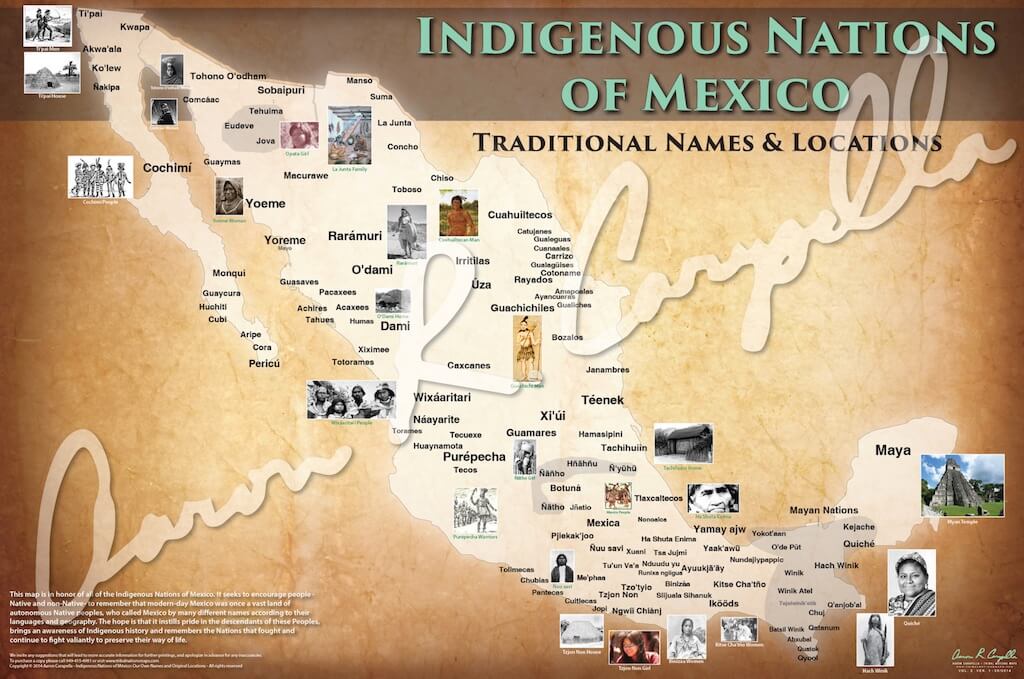To view this page in another language, please click here:
Indigenous Nations of Mexico
The
majority of the indigenous population is
concentrated in the central and southern states.
According to the CDI, the states with the greatest
percentage of indigenous population as of 2015 are:
Oaxaca, 65.73%
Yucatán, 65.40%
Campeche, 44.54%
Quintana Roo, 44.44%
Hidalgo, 36.21%
Chiapas, 36.15%
Puebla, 35.28%
Guerrero, 33.92%
Veracruz, 29.25%
Morelos, 28.11%
Michoacán, 27.69%
Tabasco, 25.77%
Tlaxcala, 25.24%
San Luis Potosí, 23.20%
Nayarit, 22.18%
Colima, 20.43%
Querétaro, 19.17%
Sonora, 17.83%
State of Mexico, 17.00%
Baja California Sur, 14.47%
Sinaloa, 12.83%
Aguascalientes, 11.69%
Chihuahua, 11.28%
Jalisco, 11.12%
Guanajuato, 9.13%
Distrito Federal, 8.80%
Baja California, 8.54%
Durango, 7.94%
Zacatecas, 7.61%
Coahuila, 6.93%
Nuevo León, 6.88%
Tamaulipas, 6.30%
The five states with the largest indigenous-language-speaking populations are:
Oaxaca, with 1,165,186
indigenous language speakers, accounting for 34.2% of
the state's population.
Chiapas, with 1,141,499 indigenous language speakers,
accounting for 27.2% of the state's population.
Veracruz, with 644,559 indigenous language speakers,
accounting for 9.4% the state's population.
Puebla, with 601,680 indigenous language speakers,
accounting for 11.7% of the state's population.
Yucatán, with 537,516 indigenous language speakers,
accounting for 30.3% of the state's population.
Videos
Native Nations/Languages of Mexico
Amuzgo
(Oaxaca)
Aztecs
Cakchiquel
Caxcan
Chatino
Chichi-Pooloca
Chichimeco
Jonaz
Chinanteco
Chol
Chontal
(de
Tabasco)
Chuj
Cochimi
Cora
Cucapa
Cuicateca
Guarijio
Huasteco
Huave
Huichol
Ixcateco
Ixil
Jacalteco
Kekchí
Kikapu
(Mexican
Kickapoo
of
northern Coahuila state)
The Viejito ( old mans ) dance
is a mock of the Spanish overlords.
It is performed all over the state of Michoacan during
festivals and other observances.
Kiliwa
Kumiai
(Kumeyaay)
Lacandon
Lipan
Apache
north
of
Chihuahua
Mame
Matlatzinca
Mayan
(Mayan
Elders)
Mayo
Mazahua
Mixe
(words)
Mixteca
Motozintleco
Nahua
(Festival)
Olmec
Opata
(Northwestern
Sonora)
Otomi
(Festival)
Paipai
(akwa'ala)
Pame
Papago
Pimas
Popoloca
Popoluca
Purepecha
(Tarasco)
Seri
Tarahumara
Tepehua
(Fire Dance)
Tepehuano
Tequistlateco
(Chontal
de
Oaxaca)
Tlapaneco
Tojolabal
Toltec
Totonaco
Trique
Tzeltal
Tzotzil
Yaqui
Zapoteco
Zoque
